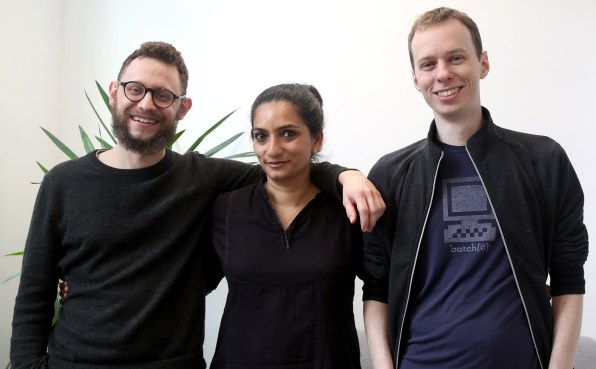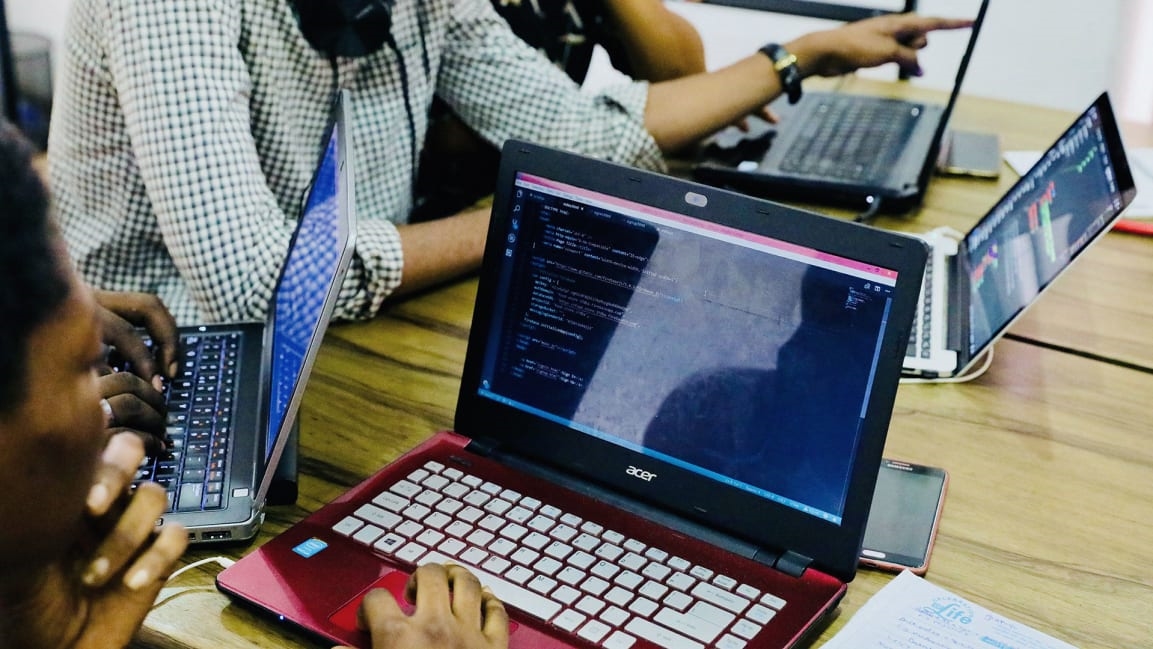This coders’ retreat is rewriting all the rules to boost diversity
Recurse Center (RC) is a three-month, self-directed educational retreat for programmers in New York City. Like a writers’ retreat or an artists’ residency, there are no teachers, no curriculum, no grades, and no certificates. It’s also free to attend. The company funds the retreat by helping alumni to find jobs, although attendees are under no obligation to use its recruitment service.
Over 50% of the people in RC’s most recent batch were women, trans, or nonbinary. Historically, around 33% of RC alumni have been drawn from those groups. CEO and cofounder Nicholas Bergson-Shilcock says this is in large part due to the $1.5 million in grants that RC has made to people from traditionally underrepresented groups in technology since 2012. You’re eligible for a needs-based grant if you are selected for RC (all applicants are held to the same admissions bar) and identify as a woman, trans, genderqueer, nonbinary, black, Latinx, Native American, or Pacific Islander.
“We don’t want RC to look like the broader technology industry where women and other groups are vastly underrepresented,” says Bergson-Shilcock. “Both the educational and business value of RC comes from the strength and quality and diversity of participants themselves.”
RC is diverse in other ways, too. Only 25% to 40% of attendees have a degree in computer science. “We have had people who are 16 to 60, people who didn’t finish high school to people who have PhDs in computer science, people who have almost never worked with other programmers and are entirely self-taught, to people who have been staff engineers at Google,” says Bergson-Shilcock.
The Fellowship
RC’s team wanted an even more diverse pool of participants and decided to try something new. RC’s grants are needs-based. If you have been accepted to RC but cannot afford to attend, you can apply for a grant for living costs of up to $7,000. The new fellowships of up to $10,000 were targeted at women, trans, and nonbinary people who wanted to work on ambitious, open source programming projects. Selection was purely merit-based rather than needs-based.
The projects pursued by fellows are also diverse. Kathy Jang is improving machine learning algorithms for self-driving cars to facilitate better traffic flow and congestion control. Meredith Finkelstein is building a blockchain for prayer. Isla Jean Carson is working on algorithms for genome assembly, which take a large number of short DNA sequences and put them back together to create a representation of the original chromosomes from which the DNA originated. This is tricky since you don’t know where any of the sequences were originally located in the genome.

[Photo: James Keene, courtesy Recurse Center]
“It becomes a massive jigsaw puzzle where we don’t know the picture on the outside of the box,” says Carson. “These puzzles are solved by first sorting the pieces into groups that share similar features. Then we search for pieces with matching edges.”
To assemble even small genomes requires hundreds of gigabytes of memory and hours of processing time. Carson developed a lossless linear time compression method that reduces the memory required for the input data by up to 72%. The data can be used in its compressed form by the sorting algorithm to speed up processing. By understanding and exploiting the behavior of the data being sorted, Carson has designed an algorithm comparable on speed and memory usage with more complicated approaches in use today. This could help make genome assembly more accessible to researchers who don’t have a supercomputer or reduce costs for those who do.
Carson had just completed her master’s thesis in computational genome assembly when she saw the blog post about RC’s new fellowships. Having already spent time at RC as part of a 2016 batch, she jumped at the opportunity. Before that first stint at RC, Carson only had a few months of programming experience. Her time at RC had been a life-changing experience.
“I came here feeling like I had a bit of imposter syndrome,” says Carson. “It changed how I viewed myself. I left there viewing myself as a programmer.”
How it all started
In 2010, Bergson-Shilcock spent a year as the cofounder of a recruitment startup. “The biggest challenge was that there just weren’t enough great programmers in the world,” he says. “We had been discussing how, far in the future, we wanted to create the programming education that we had wanted for ourselves. Then it dawned on us that we could build a new type of programming environment that would help both attract and grow more great programmers.”
In 2011, RC (at the time called Hacker School) hosted its first batch of programmers. RC’s self-directed philosophy is heavily influenced by unschooling, an educational movement founded by John Holt in the 1970s. Unschoolers believe that people are naturally curious and that traditional schooling drains them of that curiosity, so instead children should choose what they want to learn and how, outside of a classroom setting.

[Photo: James Keene, courtesy Recurse Center]
“Prior to college I never went to school,” says Bergson-Shilcock. “My parents started unschooling my three older sisters and myself from the mid-1970s. So all four of us grew up treating the world as our classroom and having a very self-directed education.”
Recursers must decide what their goals are, why they have them, how they want to work toward them, and how to determine whether they are succeeding or failing. Many people struggle with the level of self-direction this demands.
“For most people, most of their time in the world prior to RC has not been truly self-directed,” says Bergson-Shilcock. “People here are forced to really think about ‘Why am I doing this? What’s important to me? How am I going to make progress?’ For many people, the biggest benefit they get from their experience at RC is the opportunity to engage in that struggle and hopefully work through it.”
Social rules
Another unorthodox aspect of RC is its four social rules: no “well-actuallys,” no “backseat driving,” no “feigned surprise,” and no “subtle-isms.” These mandates help create a welcoming environment for groups traditionally underrepresented in tech. All four social rules were in place by the end of RC’s third batch to tackle behaviors the founders thought were detrimental to the educational experience. Anyone who has worked in a development team will recognize how these rules could help improve the working environment.
A “well-actually” happens when you correct someone about something that’s not relevant to or, at best, tangential to the topic at hand. These corrections aren’t helpful and focus attention on the person making the “well-actually.”
Alice: I just installed Linux on my computer!
Bob: It’s actually called GNU/Linux.
This rule was first implemented at Bergson-Shilcock’s pre-RC recruitment company. “We would make nitpicky corrections of each other that didn’t move the company forward,” he says. “By naming it, we were able to greatly reduce it in ourselves and it made for a much more pleasant working environment.”
“Feigning surprise” is expressing surprise that someone doesn’t know something. It makes questioners feel bad and less likely to ask questions in the future, which makes it harder for them to learn.
Dan: What’s the command line?
Carol: Wait, you’ve never used the command line?
“You can ask anything you want here and nobody’s gonna be like, ‘Oh, you didn’t know that?’” says Carson. “I think that environment really let me grow as a programmer because I was able to ask so many questions.”
“Backseat driving” is when you lob advice from across the room, possibly giving advice that’s not actually helpful.
Bob: What’s the name of the string copy function?
Alice: Strncpy.
Eve: (from across the room) You should use strlcpy. It’s safer.
“Subtle-isms” are subtle expressions of racism, sexism, ageism, homophobia, transphobia, and other forms of bias and prejudice. They are seemingly minor things that you say or do that make others feel unwelcome. If you box out the only woman at the whiteboard during a discussion or assume someone isn’t a programmer because of their race or gender, it’s a subtle-ism.
“I’ve described myself as a feminist, but I know I say sexist things sometimes,” says Carson. “We all do. Having the social rules there and knowing that if somebody does make a weird remark, it’s never gonna be a big deal, I think that is what leads to psychological security. ”
RC’s diversity combined with the social rules seem to create a unique environment. Marijn Haverbeke, who spent a week as an experienced resident programmer at RC, noted this in a blog post about the experience.
“That diversity works,” writes Haverbeke. “It, along with the healthy social framing provided by the organization, creates a social atmosphere very different from your typical young-white-guy tech environment. There was no emotional vacuum. I didn’t have to cringe at terrible or insensitive jokes. People weren’t one-upping each other.”
Bergson-Shilcock would like to see RC’s social rules adopted in companies and colleges to help create a better working environment for everyone. “As a woman I feel very comfortable here,” adds Carson. “I am a person before I am female. I’m a programmer before anything else.”
Fast Company , Read Full Story
(26)



